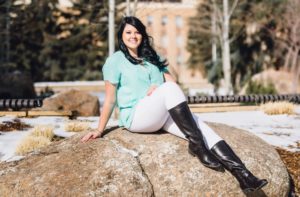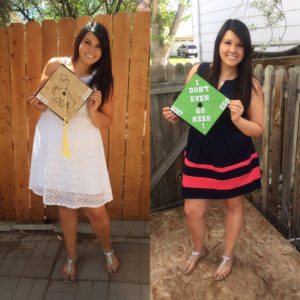As a high school student in Wyoming, Marisa DeClercq knew she wanted to pursue a career as a Family and Consumer Sciences teacher.
“My high school FCS teacher really inspired me, and encouraged me to pursue this,” she says.
DeClercq chose to attend the University of Wyoming, taking advantage of in-state tuition rates and the Hathaway scholarship, an opportunity offered to Wyoming residents attending UW that has made the pursuit of a college education possible for many students.
However, for DeClercq and many UW students like her, choosing to attend UW means missing out on their dream of teaching FCS content to secondary school students, as the university no longer offers a FCS teacher preparation program.
“I started taking classes in Human Development and Family Sciences instead,” says DeClercq, “but I knew it wasn’t what I really wanted to learn. So I started talking with Dawn Mallette to see if it was possible to take classes at Colorado State University.”
Research prompts creative solution

In fact, discussions between UW and CSU had begun several years before DeClercq approached Mallette, an assistant professor at CSU and the program coordinator for the School of Education’s FCS specialization.
Research has shown that secondary schools in all 50 states are experiencing difficulties in finding licensed and prepared FCS teachers, and are often forced to either hire teachers who are not prepared to teach the scope of FCS content or end FCS programs altogether. For Wyoming specifically, concerns regarding tuition costs and teacher preparation options, combined with research showing a strong need for licensed and prepared FCS teachers within the state’s secondary schools, prompted the search for creative solutions to the shortage.
Virginia B. Vincenti, a professor in UW’s Human Development and Family Sciences program, reached out to Mallette to discuss a potential partnership between UW and CSU. The goal of partnership was to increase the number of well-prepared candidates ready to meet the needs of FCS teaching positions in both states.
Mallette and Vincenti created a memorandum of understanding for the program, outlining the purpose, agreements, limitations, and curriculum, along with MOU review and timelines, for a variety of administrative leaders at both universities to review and recommend changes. Once revised and reviewed again, this time with the Wyoming State Board for Teacher Standards, a finalized MOU was approved in fall 2016.
Pilot program’s first participant

While the details were being ironed out, Mallette and Vincenti were authorized to begin a pilot test. For DeClercq, the timing was perfect.
“I began taking courses at CSU in January of 2016, while completing my fourth year at UW via online coursework,” explains DeClercq. “Both universities worked hard to ensure the credits I was taking would transfer between them.”
As the first graduate of this unique partner program, DeClercq is quick to praise the ability of Mallette and Vincenti to develop a solution that allowed her to pursue her dream career without having to double her time spent as a student.
“Without this program, I would’ve had to go into a master’s program—or two—just to get the content I needed to teach FCS,” she says. “It would’ve taken me a long time—at least four more years.”
Instead, DeClercq was able to graduate from CSU on May 12 with a bachelor’s degree in Family and Consumer Sciences Education, and from UW on May 13 with a bachelor’s degree in Human Development and Family Sciences, after six years of hard work.
Prepared for important work
Thanks to strong content in both university’s programs, combined with in-classroom experience, DeClercq feels well-prepared to teach FCS in a high school setting. For her three semesters of practicum experience, DeClercq was in a middle or high school classroom on a weekly basis. During her semester of student teaching, she led five FCS classes at a high school, supervised by a cooperating teacher.
“I was able to take what I’ve been learning in books and in my classes, and put them into practice in a classroom. I learned that teaching is harder than I had anticipated; that it’s one thing to learn the theory, but getting into the schools and actually teaching is another,” she says. “It’s totally worth it when I’m working with the students—applying what I’ve learned is pretty cool.”
Filling future needs
According to the terms of the MOU, the program will continue for three years, with CSU and UW remaining in constant contact as to the state of the program: concerns regarding capacity, challenges regarding resources, and any changes needed regarding curriculum, admission or transfer requirements. Following DeClercq is another UW-CSU student, who should complete the program in spring of 2018.
FCS is a program that has evolved over the years, and now encompasses a wide range of content areas—something DeClercq feels makes the program unique and vital for today’s teens.
“We teach life skills: responsibility, raising a family, career options culinary arts—what to do with their lives,” says DeClercq. “I’m teaching an early childhood class, where 15 three- to five-year-olds come to the class, and my students are putting together lesson plans and teaching the kids. They’re gaining the experience of teaching and learning if teaching is something they want to do. My culinary class created a small business of selling food items to students and teachers at the school. These students are learning restaurant, business, and management skills, as well as job skills. They’re learning about resumes, how to get a job, how to hold a job, what’s important about being an employee—we’re helping them figure out a career path before they even get to college, to make it easier once they get there.”
School district superintendents seem to agree with DeClercq, as indicated by their responses to a study conducted in 2013 by C.R. Werhan showing the continued demand for FCS teachers nationally. With this unique partnership between CSU and UW in place, both institutions hope the dual bachelor’s degree program will make a difference in Wyoming’s secondary schools.
DeClercq, currently searching for a teaching job, hopes to be making a difference in a classroom this fall.
“Kids want to be in school, they do want to learn,” she says. “They’re caring and passionate about so many things. I’ve learned a lot from them—they’re inspiring and want to do a lot with their lives.”
CSU’s School of Education is part of the College of Health and Human Sciences.